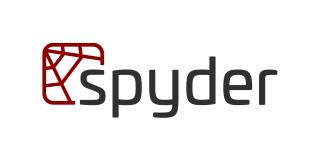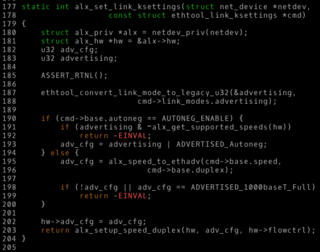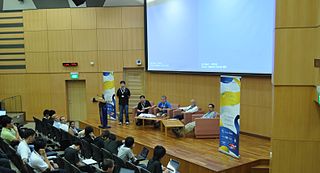Related Research Articles

Python is a high-level, general-purpose programming language. Its design philosophy emphasizes code readability with the use of significant indentation.

Guido van Rossum is a Dutch programmer best known as the creator of the Python programming language, for which he was the "benevolent dictator for life" (BDFL) until he stepped down from the position on 12 July 2018. He remained a member of the Python Steering Council through 2019, and withdrew from nominations for the 2020 election.

GNU Mailman is a computer software application from the GNU Project for managing electronic mailing lists. Mailman is coded primarily in Python and currently maintained by Abhilash Raj. Mailman is free software, licensed under the GNU General Public License.
mod_python is an Apache HTTP Server module that integrates the Python programming language with the server. It is intended to provide a Python language binding for the Apache HTTP Server.
IronPython is an implementation of the Python programming language targeting the .NET and Mono frameworks. The project is currently maintained by a group of volunteers at GitHub. It is free and open-source software, and can be implemented with Python Tools for Visual Studio, which is a free and open-source extension for Microsoft's Visual Studio IDE.
The following tables list notable software packages that are nominal IDEs; standalone tools such as source-code editors and GUI builders are not included. These IDEs are listed in alphabetic order of the supported language.

Cython is a superset of the programming language Python, which allows developers to write Python code that yields performance comparable to that of C.

The programming language Python was conceived in the late 1980s, and its implementation was started in December 1989 by Guido van Rossum at CWI in the Netherlands as a successor to ABC capable of exception handling and interfacing with the Amoeba operating system. Van Rossum is Python's principal author, and his continuing central role in deciding the direction of Python is reflected in the title given to him by the Python community, Benevolent Dictator for Life (BDFL).. Python was named after the BBC TV show Monty Python's Flying Circus.
Sphinx is a documentation generator written and used by the Python community. It is written in Python, and also used in other environments.
Gerrit is a free, web-based team code collaboration tool. Software developers in a team can review each other's modifications on their source code using a Web browser and approve or reject those changes. It integrates closely with Git, a distributed version control system.

PyCharm is an integrated development environment (IDE) used for programming in Python. It provides code analysis, a graphical debugger, an integrated unit tester, integration with version control systems, and supports web development with Django. PyCharm is developed by the Czech company JetBrains.
Kippo is a medium-interaction SSH honeypot written in Python. Kippo is used to log brute-force attacks and the entire shell interaction performed by an attacker. It is inspired by Kojoney. The source code is released under the New BSD License.

Spyder is an open-source cross-platform integrated development environment (IDE) for scientific programming in the Python language. Spyder integrates with a number of prominent packages in the scientific Python stack, including NumPy, SciPy, Matplotlib, pandas, IPython, SymPy and Cython, as well as other open-source software. It is released under the MIT license.

Snake case is the naming convention in which each space is replaced with an underscore (_) character, and words are written in lowercase. It is a commonly used naming convention in computing, for example for variable and subroutine names, and for filenames. One study has found that readers can recognize snake case values more quickly than camel case. However, "subjects were trained mainly in the underscore style", so the possibility of bias cannot be eliminated.

The Python Conference is the largest annual convention for the discussion and promotion of the Python programming language. It originated in the United States but is also held in more than 40 other countries. It was one of the first computer programming conferences to develop and adhere to a code of conduct. The conference hosts tutorials, demonstrations and training sessions.

DNF or Dandified YUM is the next-generation version of the Yellowdog Updater, Modified (yum), a package manager for .rpm-based Linux distributions. DNF was introduced in Fedora 18 in 2013; it has been the default package manager since Fedora 22 in 2015, Red Hat Enterprise Linux 8, and OpenMandriva, and is also an alternative package manager for Mageia.
RocksDB is a high performance embedded database for key-value data. It is a fork of Google's LevelDB optimized to exploit multi-core processors (CPUs), and make efficient use of fast storage, such as solid-state drives (SSD), for input/output (I/O) bound workloads. It is based on a log-structured merge-tree data structure. It is written in C++ and provides official language bindings for C++, C, and Java. Many third-party language bindings exist. RocksDB is free and open-source software, released originally under a BSD 3-clause license. However, in July 2017 the project was migrated to a dual license of both Apache 2.0 and GPLv2 license. This change helped its adoption in Apache Software Foundation's projects after blacklist of the previous BSD+Patents license clause.

qutebrowser is a QtWebEngine web browser for Linux, Windows, and macOS operating systems with Vim-style key bindings and a minimal GUI. It is keyboard-driven and is inspired by similar software such as Vimperator and dwb. It uses DuckDuckGo as the default search engine. qutebrowser is included in the native repositories of Linux distributions such as Fedora and Arch Linux. qutebrowser is developed by Florian Bruhin, for which he received a CH Open Source award in 2016.
TerminusDB is an open source knowledge graph and document store. It is used to build versioned data products. It is a native revision control database that is architecturally similar to Git. It is listed on DB-Engines.
References
- ↑ Disputed by Wales; "I am not the benevolent dictator of anything"
- 1 2 Guido van Rossum (2008-07-31). "Origin of BDFL". Artima.com. Archived from the original on 2012-07-21. Retrieved 2008-08-01.
- ↑ "Python Creator Scripts Inside Google". eWeek . 2006-03-06. Archived from the original on 2018-08-09. Retrieved 2008-05-13.
- ↑ Van Rossum, Guido (July 12, 2018). "Transfer of power". mail.python.org. Archived from the original on July 12, 2018. Retrieved August 9, 2018.
- ↑ Raymond, Eric S. (2000). "Homesteading the Noosphere § Project Structures and Ownership". Eric S. Raymond's Home Page. Archived from the original on 2012-07-01. Retrieved 2008-08-01.
- ↑ "Spacemacs COMMUNITY.org". GitHub . Retrieved 2017-08-24.
- ↑ Pearson, Jordan (24 April 2017). "Ethereum's Boy King Is Thinking About Giving Up the Mantle". Vice. Retrieved 5 September 2023.
One participant called him a benevolent dictator.
- ↑ Fay, Randy. "How Do Open Source Communities Govern Themselves? | RandyFay.comties Govern Themselves?". randyfay.com. Retrieved 27 November 2020.
- ↑ "Keras API Special Interest Group, Leadership". GitHub . December 21, 2021.
- ↑ "56: Ember vs. Elm: The Showdown with Philip Poots | The Frontside Podcast". The Frontside Podcast. Archived from the original on November 16, 2018. Retrieved 2017-08-14.
- ↑ elm-conf (2016-09-19), "Code is the Easy Part" by Evan Czaplicki , retrieved 2017-08-14
- ↑ "Dolibarr project organization, different roles of actors".
- 1 2 Constine, Josh (December 7, 2012). "Dropbox Hires Away Google's Guido Van Rossum, The Father Of Python". TechCrunch. Retrieved June 1, 2015.
- ↑ "Clojure JIRA Workflow". Archived from the original on November 13, 2015. Retrieved 3 October 2015.
- ↑ "Adrian and Jacob retiring as Django BDFLs". Adrian Holovaty. January 12, 2014. Retrieved June 14, 2015.
- ↑ "Proposal: Create a standard process for proposals". GitHub .
- ↑ "Interfacing with Zig, a BDFL-run Project". Loris Cro's Blog . December 10, 2021. Retrieved April 14, 2024.
- ↑ "A History of OCaml | OCaml.org" . Retrieved 2015-09-18.
- ↑ "OCaml Infrastructure mailing list" . Retrieved 2015-09-18.
- ↑ Introducing Alluxio Open Source Project Governance ""
- ↑ "Governance Structure: JuMP" . Retrieved 2023-09-13.
- ↑ "A Ruby Design Process" . Retrieved 2016-04-17.
- ↑ "pandas 0.20.3 documentation: Tutorials" . Retrieved 2017-07-24. "Wes McKinney's (pandas BDFL) blog"
- ↑ "TerminusDB, Twitter". May 6, 2020. Retrieved May 6, 2020.
- ↑ "TerminusDB — what's in a name?". TerminusDB. August 21, 2019. Retrieved May 8, 2020.
- ↑ "Why Neovim is Better than Vim". January 15, 2015. Retrieved 30 September 2015.
- ↑ "Thesis, Automattic, and WordPress | Post Status". July 24, 2015. Retrieved 2015-07-24.
- ↑ "Programming in Scala Leaps onto the World Stage!" . Retrieved 2015-11-25.
- ↑ "Taylor Otwell, Twitter". Taylor Otwell. October 9, 2014. Retrieved October 9, 2014.
- ↑ "Taylor Otwell, Creator of the Laravel PHP Framework". Facebook . August 5, 2014. Retrieved August 5, 2014.
- ↑ Robbins, Arnold (March 2014). "The GNU Project and Me: 27 Years with GNU AWK" (PDF). skeeve.com. Archived (PDF) from the original on October 6, 2014. Retrieved August 11, 2023.
- ↑ "Mastodon is crumbling—and many blame its creator". The Daily Dot . January 18, 2019.
- ↑ "Developer Intro/Overview" . Retrieved 20 July 2018.
- ↑ "Orchard Project Steering Committee". Archived from the original on August 12, 2015.
- ↑ "Ubuntu carves niche in Linux landscape". CNET. Archived from the original on 6 November 2015.
- ↑ "CONTRIBUTING.md · master · redox-os / redox". July 8, 2023.
- ↑ "Contributing to the F# Language and Compiler" . Retrieved 29 September 2015.
- ↑ Dee-Ann LeBlanc (31 July 2006). Linux For Dummies (7th ed.). John Wiley & Sons. p. 15. ISBN 978-0-470-04793-4.
- ↑ "Elixir Companies". GitHub . Retrieved 2017-11-01.
- ↑ "SciPy 1.0.0". GitHub . Retrieved 2017-10-27.
- ↑ "SciPy project governance". GitHub . Retrieved 2017-10-27.
- ↑ "Stories of Linux: A Look at Slackware Linux". linux.com. Archived from the original on October 30, 2014. Retrieved September 21, 2014.
- ↑ "User and Developer Community | Post Status" . Retrieved 2015-08-13.
- ↑ Chozick, Amy (June 27, 2013). "Jimmy Wales is Not an Internet Billionaire". The New York Times.
- ↑ "Jeremy Walker on Being the BDFL of Exercism by Humans of Open Source • A podcast on Anchor". Anchor. Retrieved 2021-03-26.
- ↑ Book: Building Websites with DotNetNuke 5, Michael Washington and Ian Lackey, Packt Publishing. Page 14 "The core team comprises individuals invited to join the team by Shaun Walker, whom they affectionately call the "Benevolent Dictator".
- ↑ "The Art of Ballistic Programming". Archived from the original on June 17, 2013.
- ↑ "PyTorch Governance | Maintainers — PyTorch 2.0 documentation". pytorch.org. Retrieved 2023-03-21.
- ↑ Trino and the BDFL model https://trino.io/blog/2023/04/06/trino-bdfl-focus.html
- ↑ Jenkins Enhancement Proposal #1: BDFL https://github.com/jenkinsci/jep/blob/master/jep/1/README.adoc#bdfl
- ↑ RedBeanPHP index page https://redbeanphp.com/index.php?p=/welcome#sponsor
- ↑ BitTorrent Enhancement Proposal #1: The BEP Process https://www.bittorrent.org/beps/bep_0001.html
- ↑ "Polars - About us". 2024-04-07. Archived from the original on 2024-03-24.
- ↑ "Lightning Governance — PyTorch Lightning 2.3.0dev documentation". lightning.ai. Retrieved 2024-04-10.
- ↑ "Addressing the Future of ABAP: The Power of Open Source". 2024-06-06.
{{cite web}}: CS1 maint: url-status (link)